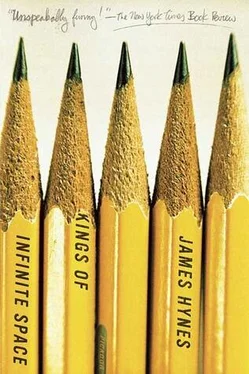“ ‘Pumpkin?’ ” said Paul when Kym got home. “I know,” she said, rolling her eyes. “The news director told him not to do it again. He was crushed.”
“He looks like a lawn statue,” Paul laughed. “The Weather Gnome.”
“Stop!” laughed Kymberly in a two-syllable singsong, batting his arm, but over time she seemed to find the sobriquet less funny. Paul was too busy foundering professionally to notice. He taught composition at Lamar Community College for a couple of semesters, for a thousand dollars per course, but when the budget was cut they let him go. After that, Kym agreed to support him for six months while he wrote a book. He worked fitfully on a memoir of his expulsion from academia, leaving out the adultery and cat drowning, only to learn from an acquaintance in publishing that the market was glutted with memoirs of downsized academics recovering their self-worth, saving their marriages, and becoming better fathers through redemptive manual labor. Everybody was looking for a gimmick; one guy, Paul was infinitely wearied to discover, was writing horror stories set in academe.
When Kymberly found out that Paul spent more time napping and going to the movies every day than he did writing, she bullied him into taking a job at a textbook company, the Harbridge Corporation. For eight months Paul sat in a little gray cube under harsh fluorescent lighting and composed grammar exercises for grades six through twelve. His job was to update an old workbook by expunging any content that did not meet the textbook guidelines of Texas and California, the company’s two biggest markets. Fundamentalist Texas forbade even the most benign references to the supernatural (the first step towards the Satanic sacrifice of newborns), while nutritionally correct California forbade any references to red meat, white sugar, or dairy products (the biochemical causes of racism, sexism, and homophobia). Pretty quickly the effort to write exercises that were simultaneously inoffensive to Dallas and San Francisco left Paul struggling to stay awake in front of his computer screen by the middle of every afternoon. In his stupor he began to imagine an actual battle on his desktop, a ragged collision of Lilliputian armies out of Spartacus: a well-drilled phalanx of Promise Keepers and West Texas cattlemen on his right versus a scruffy rabble of Berkeley vegans and Earth Firsters on his left.
Paul’s supervisor, Bonnie, was an embittered former high school English teacher from Little Rock who had lost her job to budget cuts. He attempted to express solidarity with her as one academically displaced person to another by dropping quotes from Milton and Pound, but this only humiliated her; Bonnie’s knowledge of the canon was limited to middlebrow high school “classics” like Catcher in the Rye or To Kill a Mockingbird , and she didn’t get the jokes. In return, she never missed an opportunity to remind him how far he had fallen from his prestigious Yankee university. “Guess they didn’t get around to adjective clauses up there in Minnesota,” she’d say, handing him back a clumsily executed exercise to do over. Paul retaliated by surfing the Web all day and deliberately missing deadlines. When he was really pissed off, he composed items with inappropriate references that he figured Bonnie wouldn’t get—“Mr. Humbert (brought, brung) Dolores a banana”—or arranged an exercise so that the first letter of each item spelled out a subliminally subversive message like “MEAT IS GOOD” or “BOW TO SATAN” or (in a twenty-item review exercise he was particularly proud of) “SATAN SEZ EAT MORE CANDY.” And when he was feeling unusually ambitious, he combined the two techniques into one exercise:
In each of the following sentences, underline the direct object once and the indirect object twice. Not all sentences have an indirect object.
1. I gave Renfield instructions not to wake me until sunset.
2. Lizzie offered her father a close shave that morning.
3. Oliver, have you told Mr. Fagin about the missing waller?
4. Vita showed Virginia a thing or two.
5. Eagerly, Oscar taught Bosie the backstroke.
6. Sid gave Nancy the surprise of her life.
7. Affectionately, Mrs. Donner gave Jeffrey a second helping.
8. Tara offered Willow a token of her affection.
9. After a delicious Irish stew, Mr. Swift told us his modest proposal.
10. Norman gave his mother a carving knife for her birthday.
Paul complained bitterly about Bonnie at home, especially on those days when she had caught him asleep in front of his monitor in the middle of the afternoon. What he didn’t tell Kym was that most of his coworkers were pert and stylish young women ten years younger than him, women just out of college who wore airy sundresses or tight, wraparound skirts to the office all summer long and decorated their cubes semi-ironically with magazine photos of pretty-boy actors. Some of these girls found Paul’s wiseass bitterness intriguing, and they slouched fetchingly in his cube doorway and flirted with him about books and movies, grad school life, or last night’s episode of Buffy the Vampire Slayer . One of them, a dark little Russian emigré named Oksana who worked in the Harbridge science department, took Paul into her bed on the evenings when Kym was working. Oksana had a wry twist to her lips and an adorable accent. “Say ‘moose and squirrel,’ ” he’d murmured to her in the clinch, and she’d slapped him on the backside and whispered salacious Russian in his ear.
On those evenings when Kym was working and moody Oksana did not want to see him, Paul haunted the coffeehouses near the campus, where he could eye bohemian young women or intense graduate students in sleeveless blouses over a copy of the local alternative weekly. He had prepared a story to explain his situation in case he managed to engage one of these thrilling women in conversation; the last thing he wanted them to know was that he was a failed English professor. Instead, he told them that he was a former writer/producer for The X-Files , and that he had walked away from his television career and moved to Lamar to write a novel. “I wanted to get out before the show went down the tubes,” he was going to tell them, and he had prepared answers to the questions he thought he was likely to get: “He’s an asshole.” “She’s even smarter than she looks.” And “I wrote the ones about worms. If it had a worm or worms in it, that one was mine.” But in the end, he wasn’t able to use the story. In one of the coffeehouses, a renovated old house with creaking floors and mismatched couches and easy chairs, he ran into Virginia Dunning, an old friend of his ex-wife’s from graduate school. Paul had always considered Virginia a bit too, well, virginal for his taste, but since he had known her in Hamilton Groves she had picked up a mordant wit that Paul found instantly attractive. To Paul’s astonishment and envy, Virginia was not only a tenured full professor before she was thirty, she was already chair of the Longhorn State History Department. To his further surprise she invited him back that first night to her little Texas bungalow, where, as luck would have it, she lived with a cat, whose name was Sam, and who put his ears back and flattened himself to the floorboards at the sight of his mistress and Paul coming through the door. “Don’t mind him,” said Virginia, “he’s an idiot.” Paul laughed, but he wasn’t quite sure if Virginia was talking to him or to the cat.
Virginia’s avidity in bed was yet another surprise. “I’ve never fucked a department chair before,” he murmured in her ear, and Virginia flung him onto his back, straddled him, and said, “Let’s see if you’re tenure material, Professor.” Afterwards she rolled over and went to sleep, and on the drive home, Paul had time to contemplate the three women in his life, none of whom knew about the other two. He’d told Oksana that he lived alone, and he’d told Virginia that he was working as an “independent scholar,” a dodge he’d come across during his abortive attempt to write a book. Rattling home through the hot Texas night, Paul thought, my life could be worse.
Читать дальше












